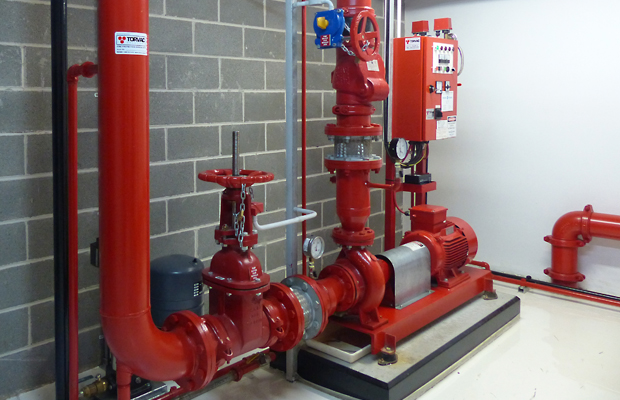Pre-Action Fire Sprinklers Systems are ideal for sensitive areas or workspaces. Typical applications include Museums, Libraries, Archives, Computer rooms and cable/ transformer rooms. For these areas, water must be kept out of the sprinkler piping until an electric detecting device and a sprinkler have both been activated. To prevent accidental discharge the piping contains low pressure supervisory air.

The operation of single interlock systems is similar to dry systems, except that these systems require a “preceding” fire detection even. The activation of a heat or smoke detector, takes place prior to the “action” of water introduction. With the pre-action valve is open, water enters the system’s piping. A Pre-action valve is a mechanically latched valves (similar to a deluge valve).
The system is converted from a dry system into a wet system. The intent is to reduce the undesirable time delay of water delivery to sprinklers that is inherent in dry systems. Prior to fire detection, if the sprinkler operates, or the piping system develops a leak, loss of air pressure in the piping will activate a trouble alarm. In this case, the pre-action valve will not open due to loss of supervisory pressure, and water will not enter the piping.
Double interlock systems are similar to deluge systems, with the exception that automatic sprinklers are used. These systems require that both a “preceding” fire detection event, typically the activation of a heat or smoke detector, and an automatic sprinkler operation take place prior to the “action” of water introduction into the system’s piping. Activation of either the fire detectors alone, or sprinklers alone, without the concurrent operation of the other, will not allow water to enter the piping. Double interlock systems are dry systems. The reason is water does not enter the piping until a sprinkler operates. Similarly they also require a larger design area.
If your property contains precious, irreplaceable items or documents, Torvac can assess your property’s requirements and design, install and maintain your system to comply with all current Australian Standards.


The Australian Museum, established in 1827 houses valuable collections of great cultural and historical significance to Australians. Torvac Solutions have recently installed two new Pre-Action Fire Sprinkler Systems at The Australian Museum in Sydney. Both systems protect the Anthropology collection of the Museum. Our team worked closely with Facilities and Collection Managers as well as the Security Department to ensure a seamless installation.
Pre-action sprinkler systems used in locations where accidental activation is catastrophic, such as in museums with rare art works, manuscripts, or books; and Data Centres, for protection of computer equipment from accidental water discharge.
Pre-action Fire Sprinkler Systems are hybrids of wet, dry, and deluge systems, depending on the exact system goal. There are two main subtypes of pre-action systems: single interlock, and double interlock.
The operation of single interlock systems are similar to dry systems. The exception is that these systems require a “preceding” fire detection event. Typically, the activation of a heat or smoke detector, takes place prior to the “action” of water introduction into the system’s piping by opening the pre-action valve. This way, the system changes from a dry to a wet system. The intent is to reduce the undesirable time delay of water delivery to sprinklers that is inherent in dry systems. Prior to fire detection, if the sprinkler operates, or the piping system develops a leak, loss of air pressure in the piping will activate a trouble alarm. In this case, the pre-action valve will not open due to loss of supervisory pressure, and water will not enter the piping.
The operation of double interlock systems are similar to deluge systems, with the exception of automatic sprinklers. These systems require that both a “preceding” fire detection event, typically the activation of a heat or smoke detector, and an automatic sprinkler operation take place prior to the “action” of water introduction into the system’s piping. Activation of either the fire detectors alone, or sprinklers alone, without the concurrent operation of the other, will not allow water to enter the piping.
Interested in talking to a Pre-Action Sprinkler System Specialist?